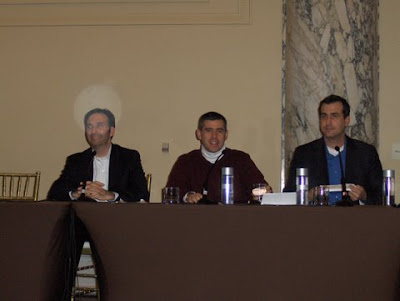
Days away from the coalface, snug in an all-expenses-paid hotel. It sounds like the ideal break from work. But too many of us have been caught out by the annual sales conference before and won’t be getting too excited.
Of course you do hear of colleagues whisked off to Teneriffe for a long weekend of sun, sea and a little light presentation over the Sangria. But for most of us the destinations are closer to home: usually a hotel in a place where you’d never dream of staying, with traffic islands next to motorways a firm favourite. Yes, Grays Thurrock, Slough and Croydon are all hot spots in the sales conference pantheon.
Essential hotel ingredients include a ‘Conference Special’ package (share a room with an emo fan from Distribution and bring your own UHT milk) with food that was freeze-dried in Taiwan in the Nineties. And this is probably the high point. Although the hotel claims to have extensive bar facilities, a sport complex and Jacuzzi, these are not for the likes of you.
You barely have time to check out how many miniature executive hair gels you can remove from your room, when the punishing schedule whisks you away to your first meeting. Your unconscious can’t understand why you are drawing people with bubble perms on a hotel blotter when you should be flat out in the sauna. Most people in the NormanTebbit Conference Room are either tense (they’ve got to do something) or asleep (they haven’t). Considerately, the hotel management provides Mint Imperials, which enable at least one person (probably you) to have a serious choking fit and wake up the somnolent.
The lights go down and there’s an audible yawn as sales figures appear and company forecasts appear on screen. Your MD then proceeds with the most ecstatic speech you are likely to hear this side of the Mount of Olives. Is this really the company you work for or is there some mistake?The VIPs are now escorted out - on one of any importance stays at a sales conference in Grays Thurrock longer than they can help it - the lights come on and the MD takes his jacket off. Then it begins. Employees are berated for their failings as if personally responsible for the state of the British economy. Reps are informed that if sales don’t improve they’ll be back in Toyotas.
Once this ritual is over a feeling of nausea overtakes you. It isn’t just the effect of having drunk 16 glasses of Perrier, but the thought that it’s your turn next. A sales conference isn’t worth its name if unsuitable introverted members of staff aren’t required to perform in front of everyone. Don’t cheer yourself up by thinking about dinner. In order to promote networking management will sit you between a sanitary engineer and someone who cleans the telephones and make sure there is no escape by banning alcohol.
But do expect exemplary politeness and restraint from colleagues as the evening proceeds. Everyone is so aware of the possible tacky implications of a sales conference on a traffic island in outer London that there must be no errant body language. People walk along the hotel’s corridors as if welded to the walls. Keys are fumbled with at record speed. No one says good night lest they be accused of sexual harassment. All you have to look forward to is a choice between Emmanuelle 38 or Lassie Comes Home on the TV.
At least this close to the M25 no one can hear you scream.


